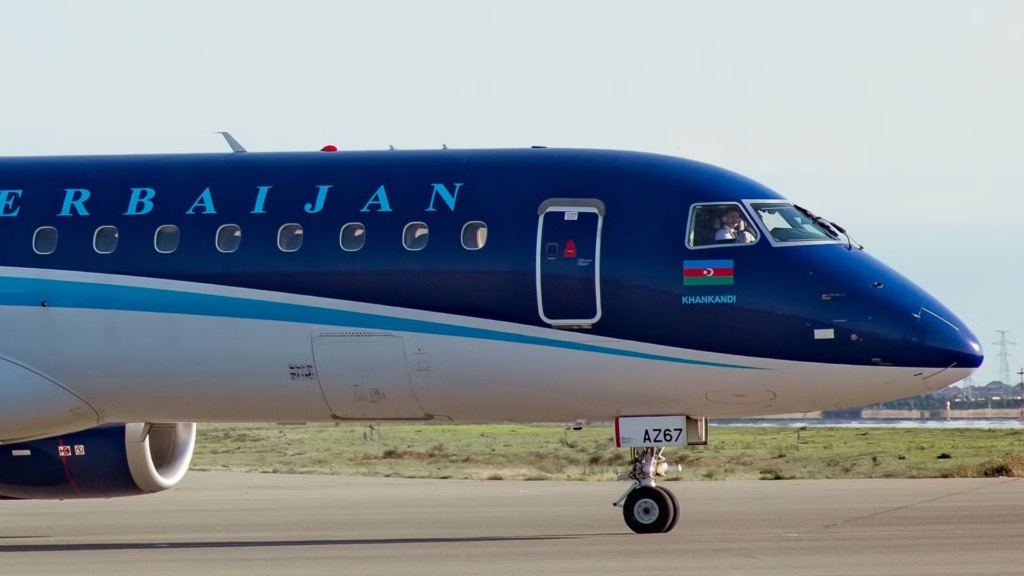Russia’s Vladimir Putin elected to admit that Russian air defenses ultimately caused the December 25, 2024, downing of an Azerbaijan Airlines Embraer E190, killing 38 people. He told Azerbaijan President Ilham Aliyev in Dushanbe that missiles fired at a Ukrainian drone detonated near the aircraft as it approached Grozny. Putin pledged both his government’s accountability in the situation and financial compensation.
The aircraft in question diverted and ultimately crashed near Aktau in Kazakhstan. Earlier investigations into the incident noted that foreign metal objects found in the wreckage were consistent with a missile explosion near or with the aircraft. This admission follows months of Russian ambiguity and Azerbaijani criticism of a cover-up of the situation. European and global news outlets have reported this incident as Putin’s first explicit acknowledgment of responsibility in the situation.
A Deeper Look At The Incident And Its Specifics
Azerbaijan Airlines Flight J2-8243, an Embraer 190 service from Baku to Grozny, was struck when Russian air-defense missiles aimed at a Ukrainian unmanned aerial vehicle (UAV) detonated near the passenger aircraft, which was on approach to Chechnya. This blast ultimately peppered the airframe with foreign metal objects, which damaged stabilizers, hydraulics, and trim systems.
The crew that was involved in the incident ultimately diverted across the Caspian Sea but lost control of the aircraft as it attempted to land near Aktau, Kazakhstan. Thirty-eight passengers died as a result of the incident, while 29 survived. Investigations would later identify fragments consistent with a Pantsir-S1 missile inside the fuselage. Putin, who was meeting with Azerbaijan’s leader, acknowledged Russian responsibility for the tragic incident that took place on Christmas Day.
What Happened In The Wake Of The Incident?
After this crash, officials in Baku had quickly announced that the jet had been hit by Russian air-defense fire while approaching Grozny, with drone activity taking place in the surrounding area. A Kazakh preliminary report on the incident later found the fuselage to be riddled with holes from external fragments, which was ultimately consistent with a missile event. Azerbaijan ultimately said that Pantsir-S1 pieces were recovered from the aircraft’s wreckage.
Moscow initially expressed its regret but ultimately stopped short of accepting blame for the incident, and the Russian government attempted to float alternative explanations for the accident while also stressing that all efforts were ongoing. The one thing that Moscow did not do which immediately attracted the attention of passengers from all over the globe. This ultimately fueled Azerbaijani accusations of a cover-up and continued to strain the ties between the two nations.
On October 9, 2025, around ten months after the incident took place, Vladimir Putin finally decided to admit direct responsibility for the incident. Two Russian missiles were then confirmed to be the reason behind the incident. In a single day, very little changed for Western aerospace regulators and investigators, who were fairly sure that Russia had been behind the accident all along. However, financial compensation for families could be a very significant development. That is, if Putin actually follows through on his promise.
What Is The Bottom Line?
At the end of the day, Azerbaijan Airlines Flight 8243 is a tragic accident, and one caused as a result of the direct conflict taking place near the airspace where the commercial aircraft was flying. This further highlights the danger posed by these kinds of conflicts and how they can lead to serious safety-related incidents in passenger aviation.
For the families, this particular admission of guilt may offer long-awaited closure to those who had been waiting to finally hear Putin acknowledge his role in the accident. The financial compensation that could come along with this also demonstrates Putin’s commitment to repairing the strain in its relationship with Azerbaijan that this incident caused.
At the end of the day, geopolitical conflict makes commercial aviation less safe. Passengers will need to continue evaluating the geopolitical risks that could be associated with their air travel.





